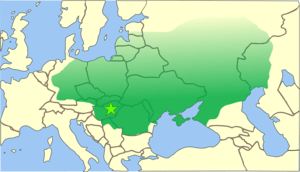453
Year 453 (CDLIII) was a common year starting on Thursday (link will display the full calendar) of the Julian calendar. At the time, it was known as the Year of the Consulship of Opilio and Vincomalus (or, less frequently, year 1206 Ab urbe condita). The denomination 453 for this year has been used since the early medieval period, when the Anno Domini calendar era became the prevalent method in Europe for naming years.
| Millennium: | 1st millennium |
|---|---|
| Centuries: | |
| Decades: | |
| Years: |
|
| 453 by topic |
|---|
| Leaders |
| Categories |
|
| Gregorian calendar | 453 CDLIII |
| Ab urbe condita | 1206 |
| Assyrian calendar | 5203 |
| Balinese saka calendar | 374–375 |
| Bengali calendar | −140 |
| Berber calendar | 1403 |
| Buddhist calendar | 997 |
| Burmese calendar | −185 |
| Byzantine calendar | 5961–5962 |
| Chinese calendar | 壬辰年 (Water Dragon) 3149 or 3089 — to — 癸巳年 (Water Snake) 3150 or 3090 |
| Coptic calendar | 169–170 |
| Discordian calendar | 1619 |
| Ethiopian calendar | 445–446 |
| Hebrew calendar | 4213–4214 |
| Hindu calendars | |
| - Vikram Samvat | 509–510 |
| - Shaka Samvat | 374–375 |
| - Kali Yuga | 3553–3554 |
| Holocene calendar | 10453 |
| Iranian calendar | 169 BP – 168 BP |
| Islamic calendar | 174 BH – 173 BH |
| Javanese calendar | 338–339 |
| Julian calendar | 453 CDLIII |
| Korean calendar | 2786 |
| Minguo calendar | 1459 before ROC 民前1459年 |
| Nanakshahi calendar | −1015 |
| Seleucid era | 764/765 AG |
| Thai solar calendar | 995–996 |
| Tibetan calendar | 阳水龙年 (male Water-Dragon) 579 or 198 or −574 — to — 阴水蛇年 (female Water-Snake) 580 or 199 or −573 |

The Hunnic Empire (453)
Events
By place
Roman Empire
- Attila the Hun is found dead in bed, after a wedding feast with the Goth princess Ildica. He dies of a nosebleed at his Hungarian stronghold, drowning in his own blood at age 47 (approximate). The Huns celebrate a strava (lamentation) over his burial place with great feasting. Attila had intended to renew his attacks on Constantinople, and reclaim the tribute which emperor Marcian had stopped in late 450. The Hunnic Empire is divided between his sons Ellac (appointed successor), Dengizich and Ernakh. They fight over his legacy, and establish their kingdoms north of the Black Sea (Ukraine), supported by vassal states.
- July – Empress Pulcheria dies of natural causes at Constantinople. She has commissioned many new churches in the city during her reign. Her death leaves Flavius Aspar (magister militum) as the dominant influence on her husband, Marcian.
- Anthemius marries Marcia Euphemia, daughter of Marcian, and is elevated to the rank of comes. He is sent to the Danubian frontier to rebuild the border defences.
Europe
- Theodoric II succeeds his brother Thorismund as king of the Visigoths, Thorismund having been murdered, after violating the alliance with the Western Roman Empire.
Asia
- Ankō obtains the throne of his father Ingyō after the traditional order of succession and becomes the 20th emperor of Japan. His eldest brother Kinashi commits suicide, after being accused of an incestuous relationship with his sister Karu no Ōiratsume (according to the Nihon Shoki).
Births
- Brigit of Kildare, Irish patron saint (d. 524)
- Vedast, Frankish bishop (approximate date)
Deaths
- July – Pulcheria, Byzantine Empress
- Attila the Hun, ruler of the Hunnic Empire
- Helian, empress of Northern Wei
- Ingyō, emperor of Japan (approximate date)
- Kinashi, prince of Japan (approximate date)
- Liu Jun, prince of the Liu Song Dynasty (b. 429)
- Liu Shao, emperor of Liu Song (b. 426)
- Pan, concubine of Wen Di
- Thorismund, king of the Visigoths
- Wen Di, emperor of Liu Song (b. 407)
- Yin Yuying, empress of Liu Song
References
This article is issued from Wikipedia. The text is licensed under Creative Commons - Attribution - Sharealike. Additional terms may apply for the media files.